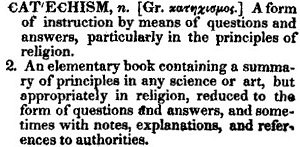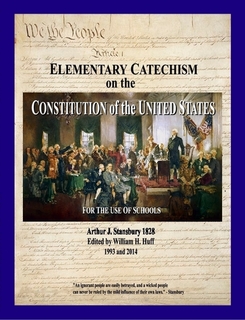NEWLY REVISED AND IMPROVED - GET THE NEW 2014 EDITION
CLICK HERE FOR THE NEW LARGE PRINT EDITION
332 Questions and Answers
+ Notes and Commentary
Elementary Catechism on the Constitution of the United States
by Arthur J. Stansbury, 1828
Revised Edition by William H. Huff, 1993
Want to know the Constitution? Then get this book! By 1839 this book was the standard textbook for learning the Constitution in American classrooms.* Written as a "catechism" in question and answer format, this new larger edition is complete with notes and excerpts from Madison's Notes on the Constitutional Convention.
The Catechism was first used in the early 1800's for school children but should be required reading in every school today. It is an excellent way to re-acquaint yourself with the nature and benefit of strict constitutional government. Those who are discovering their true heritage for the first time have asked for such material to begin their own studies.
"Catechism" defined in Noah Webster's 1828 Dictionary:

"An ignorant people are easily betrayed, and a wicked people can never be ruled by the mild influence of their own laws." - Arthur J. Stansbury
Original Features:
Stansbury's original 1828 text of 100 pages with Introduction and Conclusion, including 332 Questions/Answers on the Constitution with step by step commentary on all of the important features of "a government of law and not of men."
Features of the New Edition:
Quotes from the Founders and the Framers of the Constitution, Texts of the Declaration of Independence, The Constitution, The Bill of Rights with the Amendments up to the 26th, the Virginia Resolutions of 1798-99, Selections from Madison's Notes on the Federal Convention, and a reading list recommended by Jefferson and Madison of books said to contain the foundational principles "legitimately developed."
Editor's Notes on critical issues, and more...
Excerpts from Stansbury's Introduction:
"...remember that this precious Constitution, thus wise, thus just, is your birth-right. It has been earned for you by your fathers, who counseled much, labored long, and shed their dearest blood, to win it for their children. To them, it was the fruit of toil and danger ---to you, it is a gift. Do not slight it on that account, but prize it as you ought. It is yours, no human power can deprive you of it but your own folly and wickedness. To undervalue, is one of the surest ways to lose it. Take pains to know what the Constitution is ---the more you study, the higher you will esteem it. The better you understand your own rights, the more likely you will be to preserve and guard them. And, in the last place, my beloved young countrymen, your country's hope, her treasure, and one day to be her pride and her defence; remember that a constitution which gives to the people so much freedom, and entrusts them with so much power, rests for its permanency, on their knowledge and virtue...
The virtuous citizen is the true noble. He who enlightens his understanding--controls his passions--feels for his country's honor--rejoices in her prosperity--steps forth to aid her in the hour of danger--devotes to her advancement the fruits of his mind, and consecrates to her cause, his time, his property, and his noblest powers, such a man is one of God's nobility... We have seen such men among us; we hope to see many more."
Sample Questions from the Catechism
Don't forget our companion book: The Bill of Rights - EXPOSED!
Our books can be customized for educators, schools, fundraisers, political campaigns and activist groups. Passivist groups can simply remain passive.
______________________________
* Lexrex was recently contacted by a visitor who had purchased the Catechism on the basis of the claim that states the book was a standard in American classrooms by 1839. As far as we know at this time the statement is true. This is based on notes in an earlier 20th Century reprint of the text made the statement in its forward. We have no reason to believe the earlier reprint would misrepresent this fact. However, we have no earlier version to verify the statement. If anyone has authoritative documentation to refute this claim we would want to remove it in the interest of accuracy. In the larger context of more easily documented facts about the period it is safe to say the literacy and common knowledge of the laws and our Constitution far exceeded current levels of awareness and competence in these crucial subjects. We are of the opinion that the text of the Catechism stands on its own merits - even though it has a few errors related to the fact that Madison's Notes on the Constitutional Convention were not made public until seven years after the the Catechism was originally published. The serious student can always read Madison's Notes, Elliot's Debates, and the Federalist and Anti-Federalist Papers of course. The Catechism is just one of the best tools we have seen to get the dialog started. Modern Q&As on the Constitution tend to be rather insipid by comparison. They range mostly between trivia and brainwashing.

